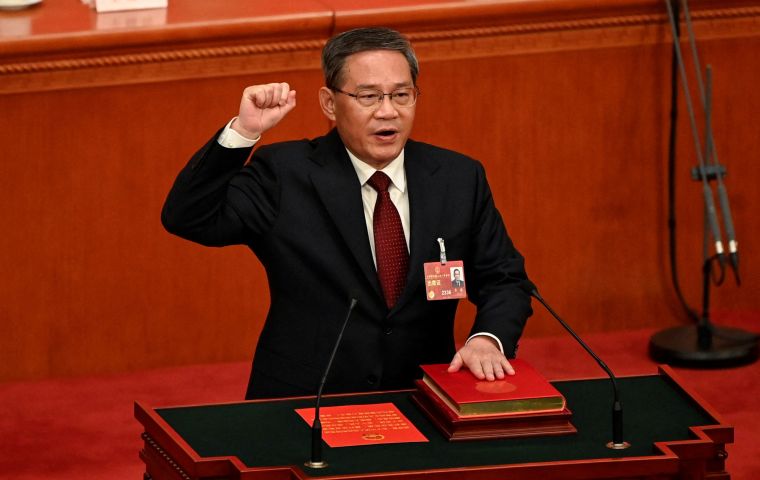MercoPress. South Atlantic News Agency
Beijing ambitious 2024 growth target, 5%, but economists and circumstances are not convinced
 Premier Li Qiang said China plans to issue US$ 139 billion in treasury bonds over the next few years while offering support to debt-laden local governments
Premier Li Qiang said China plans to issue US$ 139 billion in treasury bonds over the next few years while offering support to debt-laden local governments China on Tuesday announced an ambitious economic growth target of 5% for 2024, vowing to “seek progress while maintaining stability” amid a sluggish economy and weak confidence among investors and consumers. This contrasts with the 5,2% reported for 2023 and 3% during 2022.
Delivering his first work report since assuming the second-most powerful position in China last October, Chinese Premier Li Qiang admitted that China faces an environment characterized by opportunities, risks, and challenges but emphasized that favorable conditions still outweigh unfavorable factors, according to China’s official Xinhua News Agency.
In the face of weak economic growth worldwide and the lack of a solid foundation for China to stabilize its economic growth, Li said Beijing will continue to adopt “proactive fiscal policy and prudent monetary policy” to cope with the long list of economic challenges. For most economies in Latin America, trade with China is essential since it has become the leading trade partner for a list of commodities.
According to Li, the Chinese government plans to issue about US$ 139 billion in special treasury bonds over the next few years while offering support to debt-laden local governments and sticking with the strategy of “high-quality growth,” which focuses on driving growth through innovation.
Li’s speech comes as China faces a long list of economic challenges, including an ongoing real estate crisis, low consumer and household confidence, and weak external demand. While Li promised to expand domestic demand and increase efforts to attract foreign investment, some economists say that unless China initiates fundamental economic reforms, these plans may only be “policy slogans.”
“A lot of the strategic industries in China are controlled by state-owned enterprises and their investment efficiency is quite low,”
Wang Kuo-chen, an expert on the Chinese economy at the Chunghwa Institute for Economic Research in Taiwan, said that ”a lot of strategic industries in China are controlled by state-owned enterprises and their investment efficiency is quite low,”
In his view, even if China tries to increase support for private enterprises, state-owned enterprises, or military enterprises continue to control strategic industries in the country, it will be difficult for the Chinese government to emerge from the current economic turmoil.
Some analysts say Li’s speech shows that security remains the top concern for the Chinese government. According to statistics shared by Ruihan Huang, a senior associate at Chicago-based think tank MarcoPolo, the word security was mentioned 28 times in this year’s government work report, which is three times more than last year.
As Li doubled down on the importance of prioritizing national security in his speech, some experts argue such a governance model imposes a cost on the Chinese economy. “When [a government] invests one unit more in security, in the short term, it at least means one unit less in something else, including in growth,” Ian Chong, a political scientist at the National University of Singapore, pointed out.




Top Comments
Disclaimer & comment rules-

-

-

Read all commentsIt seem Bras’s Ancestors didn’t ‘struggle’ very hard to end slavery or social inequalities, or imperialism in Brazil.
Mar 07th, 2024 - 02:49 pm +2https://www.ilo.org/global/about-the-ilo/mission-and-objectives/features/WCMS_092663/lang--en/index.htm#:~:text=On%20May%2013th%201888%2C%20Brazil,in%20this%20South%20American%20country.
‘On May 13th 1888, Brazil became the last nation in the Western Hemisphere to formally abolish slavery. One-hundred and twenty years later, it is estimated that 25,000 to 40,000 workers are still victims of conditions analogous to slavery in this South American country.’
I trust China Brassole says. ask Vietnam, ask Indonesia, ask the Philippines, ask Malaysia, ask India, and many many more Asian nations, none of them trust China, only a commie trusts a commie, your posts get more stupid by the day Brassole,
Mar 07th, 2024 - 09:57 am +1Bon voyage.
Mar 07th, 2024 - 02:40 pm +1Commenting for this story is now closed.
If you have a Facebook account, become a fan and comment on our Facebook Page!